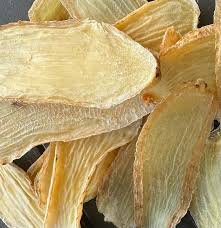Ambassador Herbs in Traditional Chinese Medicine (Part 2!)
This is a continuation of last week’s post, detailing various Ambassador herbs that are effective for directing herbs to specific body parts/meridians. As a reminder:
A typical formula consists of:
One or two Emperor herbs that have main action;
A few Assistant herbs that augment or support the action of the emperor herbs;
Several Minister herbs that mitigate the unwanted actions of the emperor herbs and;
One or two Ambassador herbs that bring the formula to the proper meridian and general location of the body.
In this article we will be discussing more of the key Ambassador herbs used for directing healing to specific areas of the body.
Eyes
Goji Berries
GOU QI ZI - 枸杞子 - FRUCTUS LYCII - LYCIUM FRUIT, or Goji Berries, belongs to the category of Herbs that Tonify Blood, and it has a special affinity for the eyes. An alternative to Goji is Chrysanthemum, which is very commonly consumed as a tea in China.
Brain
Tian Ma
TIAN MA - 天麻 - RHIZOMA GASTRODIAE belongs to the category of herbs that Extinguish Wind and Stop Tremors. It is used for headaches, dizziness and migraines, spasms, epilepsy, convulsions, and more broadly in formulas directed toward the brain. Did you know that in China, in addition to Tian Ma, Scorpion (QUAN XIE - 全蝎) has historically been used very effectively for stroke, seizure, epilepsy, and bells pallsy?
For Traumatic Brain Injury, the combination of Tian Ma with San Qi and Dan Shen can be very supportive.
For Bells Palsy, Bai Fu Zhi with Quan Xie and Bai Jiang (silkworm) can be very supportive.
Liver Channel
Chai Hu
CHAI HU - 柴胡 - RADIX BUPLEURI is very frequently used in TCM for liver or liver meridian issues. It is commonly used for patients who have pain in their ribcage, liver or gallbladder areas, and/or patients with a bitter taste in their mouths as well as a wiry pulse.
Urinary Tract
Che Qian Zi
CHE QIAN ZI - 车前子 - SEMEN PLANTAGINIS - are the seeds of the Plantain plant, the leaves of which are commonly used in western herbalism. The seeds have a particular affinity for the urinary tract, and belong to the category of Herbs that Drain Dampness.
Spleen
Dang Shen
DANG SHEN - 党参 - RADIX CODONOPSIS - also known as Codonopsis root - belongs to the category of Herbs that Tonify Qi. It enters the Lung and Spleen meridians and has a special affinity for supporting Spleen Qi and Lung Qi.
Disclaimer: All above articles are for reference only. If patients are interested, please consult a professional practitioner Traditional Chinese Medicine for a consultation.






